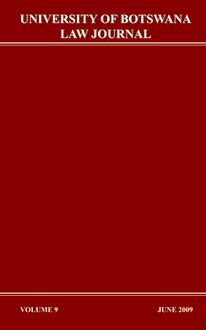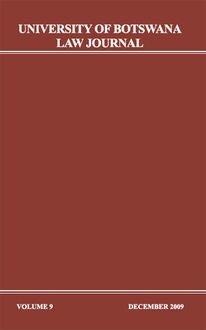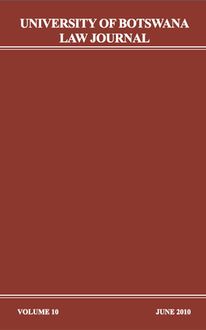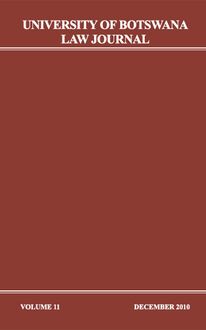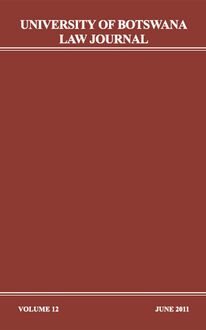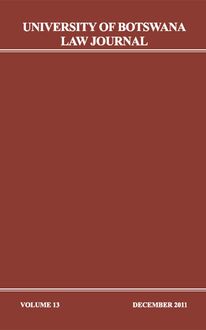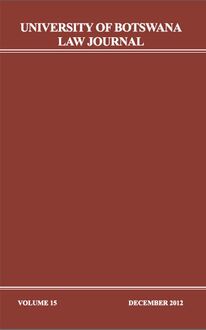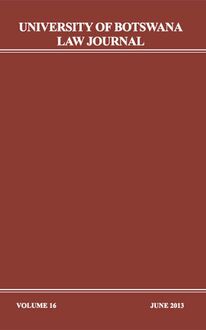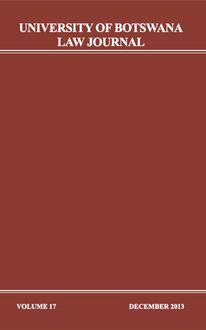-
 Univers
Univers
-
 Ebooks
Ebooks
-
 Livres audio
Livres audio
-
 Presse
Presse
-
 Podcasts
Podcasts
-
 BD
BD
-
 Documents
Documents
-
- Cours
- Révisions
- Ressources pédagogiques
- Sciences de l’éducation
- Manuels scolaires
- Langues
- Travaux de classe
- Annales de BEP
- Etudes supérieures
- Maternelle et primaire
- Fiches de lecture
- Orientation scolaire
- Méthodologie
- Corrigés de devoir
- Annales d’examens et concours
- Annales du bac
- Annales du brevet
- Rapports de stage
La lecture à portée de main
72 pages
English
University of Botswana Law Journal Volume 16, June 2013 , livre ebook
72 pages
English
YouScribe est heureux de vous offrir cette publication

Description
The University of Botswana Law Journal is a peer refereed journal published twice a year. It provides a forum for scholars and practitioners to reflect on diverse legal issues of national, regional and international significance and of local and regional relevance.PatronThe Hon. Justice Nganunu, Chief Justice of BotswanaInternational Editorial Advisory BoardProf. D. D. N. Nsereko, Judge, International Criminal Court, The Hague, The NetherlandsProf. W. Du Plessis Faculty of Law, North-West University (Potchefstroom Campus), South Africa Prof. T. Maluwa H. Laddie and Linda P. Montague Professor of Law, Dickinson School of Law, Penn. State University, USA Prof. M. Reisman Myres McDougal Professor of Law, Yale Law School, New Haven, USA Prof. K. Frimpong Ghana Institute of Management and Public Administration, (GIMPA), Accra, Ghana Prof. S. Roberts Department of Law, London School of Economics, United Kingdom Prof. A. McCall Smith Edinburgh Law School, University of Edinburgh, United Kingdom Prof. C. Forsyth Faculty of Law, Robinson College, University of Cambridge, United Kingdom Prof. B. Othlogile Vice Chancellor, University of Botswana Dr. A. Molokomme Attorney-General, BotswanaEditorial BoardProf. Peter Takirambudde Editor-in-Chief, University of BotswanaMrs. E. Macharia-Mokobi Secretary, University of BotswanaDr. K. Solo University of BotswanaProf. C. Ngongola University of BotswanaProf. J. Kiggundu University of BotswanaProf. E. K. Quansah University of BotswanaDr. O. B. Tshosa University of BotswanaMr. T. Sebego Vice chairman, Law Society of Botswana
Sujets
Informations
| Publié par | PULP (Pretoria University Law Press) |
| Nombre de lectures | 0 |
| Langue | English |
Extrait
UNIVERSITY OF BOTSWANA LAW JOURNAL
VOLUME 16 JUNE 2013
ARTICLES
Judicial review of the exercise of presidential power in Africa .................3 Enyinna Nwauche
Global antitrust and competition law: From ade facto............15system of national laws to ade jurenetwork of global competition conventions Eric Engle
Adoption of children in Botswana in a comparative perspective: ............37 Unpacking two models of adoption Rowland JV Cole, Jimcall Pfumorodze and Hauwa Nuru
NOTES
Judicial protection of women’s rights in Nigeria: The regrettable ...........59 decision inMojekwuvIwuchukwu I.N. Eme Worugji and R.O. Ugbe
ARTICLES
3
Judicial review of the exercise of presidential power in Africa
ABSTRACT
Enyinna Nwauche*
The principle that all exercise of public power no matter how couched is limited by certain standards as an incident of the rule of law is not part of the common law of many commonwealth African countries. It is even less so when the donee of the power is the president of the republic and the power is to be exercised entirely at his discretion. In some commonwealth African countries such as South Africa, Malawi Ghana and Namibia, there has been a paradigm shift towards the constitutionalisation of a right to administrative justice. In South Africa there is a consequential jurisprudence that has been articulated on the rule of law requiring that all exercise of public Power including presidential power is subject to certain standards. Against this background, this article examines the recent Zambia Supreme Court decision inAttorney GeneralvMutuna and Three Othersand its review of the exercise of Zambian presidential power to suspend judges impugned for impropriety to demonstrate the inadequacy of the Zambian common law in constraining the exercise of presidential power. It will be urged, using comparative jurisprudence from other commonwealth African countries, that the proposed right to administrative justice in the First Draft amended Zambian Constitution 2012 is a credible means of constraining the exercise of public power especially if it leads to appropriate jurisprudence that subjects all exercise of power to certain standards.
1.
INTRODUCTION
The judicial review of executive power is an important requirement of constitutionalism in Africa because of a widespread recognition of a powerful executive branch in Africa. An unrestrained executive branch would result in arbitrary exercise of power since courts would defer to their unfettered exercise of discretion. It is a key feature of the rule of law and constitutionalism that all 1 exercise of public power must be justified and be traceable to a law. If it were otherwise, many constitutional democracies would become civil dictatorships
1* 1
Associate Professor of Law University of Botswana nwauche@hotmail.com. See Wade & Forsyth Administrative Law (Tenth Edition 2009) 17; C. Stewart “The Rule of Law and the Tinkerbell Effect: Theoretical Considerations, Criticisms and Justifications for the Rule of Law” 4 (2004) Macquarie Law Journal 135.
4 UNIVERSITY OF BOTSWANA LAW JOURNAL JUNE 2013
with the attendant abuse of powers, human rights violations and socio-economic anomie. Implying certain standards into the exercise of public power ensures that courts are able to ensure fidelity to these standards and protect ordinary citizens. While the common law is capable of recognising implied standards of review of executive power, the common law of many commonwealth African countries have proved inadequate in this regard, leading to a preferred mode of constitutionalising a right to administrative justice. In turn, the recognition of a right to administrative justice does not guarantee that all executive power will be subject to certain implied standards because of the ambiguity in the meaning of ‘administrative action’ and whether presidential power is contemplated thereby. This article begins with a critical examination of the decision in 2 Attorney Generalv Mutuna and 3 othersand the principles of Zambian common law concerning the review of the exercise of constitutionally granted presidential powers. This is followed by a comparative evaluation of the review of the exercise of public power in a number of African States that have a constitutional right to administrative justice. Concluding remarks and recommendations end the article.
2.
ATTORNEY GENERALVMUTUNA AND THREE OTHERS
This is a decision of the Zambian Supreme Court. President Sata suspended the three Respondents, who were serving judges in the Zambian judiciary on the 30 May 2012, from performing their duties, pending the proceedings of a tribunal appointed pursuant to Article 98(3) of the Constitution of the Republic 3 of Zambia. The President gave a press conference in which he indicated that he had received complaints of corruption against the judges and decided to suspend them pending the outcome of an investigation against them. In the press conference, the President made allegations of impropriety, misconduct, impartiality and incompetence against the three judges related to their conduct in hearing and delivering opinions, rulings and judgments in a number of cases.
2
3
Unreported Appeal No. 088/2012 SCZ/8/185/2012. Judgment delivered on 18th September and 9th May 2013. Text of the judgment is available at www.mwebatu.com/201/05/15/full-supreme-court-judgment-on-judges-musonda-kajimanga-mutuna/ (last visited 12 October 2013). Hereafter Mutuna. Art 98(3) of the Zambian Constitution provides that “If the President considers that the question of removing a judge of the Supreme Court or of the High Court under this Article ought to be investigated, then-(a) he shall appoint a tribunal which shall consist of a Chairman and not less than two other members, who hold or have held high judicial office; (b) the tribunal shall inquire into the matter and report on the facts thereof to the President and advise the President whether the judge ought to be removed from office under this Article for inability as aforesaid or for misbehaviour.” Art 98(5) further provides that “If the question of removing a judge of the Supreme Court or of the High Court from office has been referred to a tribunal under clause (3), the President may suspend the judge from performing the functions of his office, and any such suspension may at any time be revoked by the President and shall in any case cease to have effect if the tribunal advises the President that the judge ought to be removed from office.”
JUDICIAL REVIEW OF THE EXERCISE OF PRESIDENTIAL POWER 5
It was accepted by all parties that the aggrieved parties in the cases over which the President had suspended the judges had filed appeals against the judgment of the three suspended judges. In fact, one of the suspended judges claimed lack of any knowledge of the conduct of the cases, which were the bases of the suspension. The suspended judges sought an order of certiorari to quash the decision to suspend them and the decision to constitute a tribunal to conduct an investigation of misbehaviour or incompetence. They contended that the suspension and creation of a tribunal were not in keeping with the provisions 4 of Article 91(2) of the Constitution of Zambia, as read together with the 5 provisions of the Judicial (Code of Conduct) Act. The grounds on which the relief was sought were illegality, procedural impropriety, bad faith, irrationality and reasonableness. The ground of illegality was advanced on the fact that the President did not seek the advice of the Chief Justice of Zambia as required by the Judicial Code of Conduct Act. The lack of fair hearing before suspension was the basis of the ground of procedural impropriety. The ground of reasonableness was based on the reasons advanced by the President at the press conference, which in addition to other evidence indicated that the President was being actuated by political considerations. The learned trial judge before whom the application was brought ruled that aprima faciecase had been made out as required by the rules for leave to be granted for full arguments. Dissatisfied, the President sought to discharge the leave to apply for judicial review. When that failed, the President appealed to the Supreme Court and argued that the power under Article 98(3) of the Zambian Constitution is executive in nature and that in exercising executive powers, the discretion to reach a conclusion is given without any need of consultation to the President who did not need to act judiciously by hearing the suspended judges before taking a decision. It was further argued that the constitution of the tribunal was not irrational because the decision to establish the tribunal was not outrageous and was within ordinary logic. With respect to the ground of procedural impropriety, the Supreme Court held that where a constitution grants wide discretionary powers to the President, the powers are executive powers and not quasi-judicial powers. Accordingly, there is no need to import the requirement to act judiciously by giving the suspended judges an opportunity to be heard. On the question of illegality, the Court held that article 98(5) of the Constitution was a stand-
4
5
Art 91(2) of the Zambian constitution provides that the judges, members, magistrates and justices, as the case may be, of the courts mentioned in clause (1) shall be independent, impartial and subject only to this constitution and the law and shall conduct in accordance with a code of conduct promulgated by parliament. No. 13 of 1999. This Act is made pursuant to Art 91(2) of the Zambian Constitution. The preamble to the Act states: “An Act to provide for the Code of Conduct for Officers of the Judicature pursuant to article ninety-one of the Constitution and for matters connected with or incidental to the foregoing.”
6 UNIVERSITY OF BOTSWANA LAW JOURNAL JUNE 2013
alone article which was not linked to article 91(2) of the Constitution and thus to the requirement of the advice of the Chief Justice in terms of the Judicial 6 Code of Conduct Act. The Court reasoned that the provisions of article 98(5) of the Constitution were clear and that a literal interpretation of a constitution allowed no room for extraneous requirements, which in this case would be reference to the Judicial Code of Conduct Act which mandates the advice of the Chief Justice before the President could establish a tribunal and suspend impugned judges. The Court also held that the President did not breach the irrationality ground referred to asWednesburyIn the unreasonableness. opinion of the Court:
“We are satisfied that bearing in mind the authoritative position of His Excellency, it would be illogical and unreasonable to hold that he did not receive credible information as President for him to act as he did. He is the overall authority on everything. His sources are exclusive to the public domain and must be impeccable. Also it was not established that the President’s decision was outrageous in its defiance of logic or of accepted moral standards that no reasonable person in his position could have acted in the way he did.”
We now turn to an evaluation whether the decision of the Supreme Court conforms to Zambian law. As difficult as it may sound the answer is that the court was correct based on the existing law on the review of the exercise of executive power in Zambia. On a general note, it is to be realised that the judicial review of executive (including administrative) power in Zambia is based squarely on the Zambian common law, which is itself based 7 on the English common law. InChitalavGeneral, Attorney the Zambian Supreme Court adopted three grounds of review- illegality, irrationality and procedural impropriety- for the review of administrative action in Zambia. These grounds of review are based on the doctrine ofultra vireswhich, as the fulcrum of judicial review, turns on the need to identify the nature of an endowed power and to strike down the exercise of power outside what parliament or the legislature had intended. In the development of the grounds of review the Zambian common law has drawn inspiration from English common law. It is to be remembered that English administrative law developed within the context of parliamentary sovereignty, which in its broadest reading required courts to defer to the will of parliament expressed in the grant of powers. English courts restrained the exercise of power through a
6
7
The Judicial Code of Conduct Act creates in section 20 a complaints committee which is endowed by section 24 of the Act the powers to receive complaints against judicial officers investigate same before forwarding recommendations to the Chief Justice for onward transmission to the President. [199] ZMSC 32. Available at www.zambialii.org/za/judgment/supreme-court/1995/32 (Accessed 5th Dec 2013). This position was reiterated by the Zambian Supreme Court inChilubavAttorney General(2003) ZR 153
JUDICIAL REVIEW OF THE EXERCISE OF PRESIDENTIAL POWER 7
reading of implied conditions as being within the province of what parliament intended in the grant of powers. These implied conditions have ranged from unreasonableness, error of law and the requirement of natural justice. An assessment of each ground of review inMutunafollows. The first ground is procedural impropriety. In the development of the requirement of natural justice, English courts articulated the principles of the classification of functions. Accordingly, only the endowment of judicial and quasi-judicial functions required the presence of fair hearing. The grant of executive and administrative power did not require adherence to fair hearing because executive power implied the exercise of an unfettered discretion. It is instructive to note that the classification of functions in English law as a means of determining the need for fair hearing has been abolished inRidgev 8 Baldwinand what is now required is a broad duty to act fairly in the exercise of public power. Lord Hodgson in that case stated that:
“[t]he answer in a given case is not provided by the statement that the giver of the decisions is acting in an executive or administrative capacity as if it were the antithesis of a judicial capacity. The cases seem to me to show that persons acting in a capacity which is not on the face of it judicial but rather executive or administrative have been held by the courts to be subject to the principles of natural 9justice.”
It is also instructive to note that many commonwealth legal systems have done away with the notion of classification of actions just like English law because it immunises a considerable amount of the exercise of public power. Since the Zambian common law continues to apply the principle of classification of functions, the classification of the President’s power as executive shielded it from judicial review. The requirement of natural justice would have been implied were Zambian courts to stipulate that a duty to act fairly should be discharged in the exercise of all public power. The ground of illegality is the next ground to be considered. In 10 ChitalavAttorney General,the Zambia Supreme Court set out the nature of illegality as ground of review:
8 9
10
“To succeed under this ground, the appellant has to prove that the decision of the National Assembly contravened or exceeded the
[1964] AC 40 See Lord Hodgson at p.130. See also Lord Denning inRvGaming Board for Great Britain ex p. Benaim and Khaida[1970] 2 QB 417 at 430. See Lord Diplock inAttorney GeneralvRyan[1980] AC 718, 730: [t]he Minister was a person having legal authority to determine a question affecting the rights of individuals. That being so it is a necessary implication that he is required to observe the principles of natural justice when exercising that authority; and if he fails to do so, his purported decision is a nullity. Note 7.
8 UNIVERSITY OF BOTSWANA LAW JOURNAL JUNE 2013
terms of the law which authorized the making of that decision or that the decision pursues an objective other than that for which the power to make the decision was conferred. By looking at the wording of the power and the context in which the power is to be exercised, the court’s ultimate function is to ensure that the exercise 11 of the power is within orintra-viresthe statute.”
In determining illegality as a ground of reviewing the exercise of public power, a court could engage in a literal or contextual interpretation of the enabling provision. A literal interpretation concentrates on the bare text of the legislation as a means of determining its boundaries while a contextual and purposive interpretation engages the purpose and means of the grant of power to substantively determine the meaningful boundaries of the endowed public power. These two modes of interpreting the nature of an endowed power are evident inMutunain line with the arguments advanced above. The holding of the Court that the grant of a power to suspend judges in Article 98(5) is a stand-alone power and is not triggered by the advice of the Chief Justice acting in terms of Article 91(2) of the Judicial Code of Conduct Act is an example of a literal interpretation which is a point made strenuously by the Zambian Supreme Court inMutuna. The other purposive and contextual interpretation is one which argues that:
“Article 91 and 98 without doubt are interconnected. Article 91 provides the overall context within which provisions relating to the judiciary should be interpreted. It underscores judicial independence. Article 98 cannot be interpreted in such a manner as to become a conduit of executive influence over the judiciary. The removal of judges from the bench on spurious grounds is the 12 greatest threat to judicial independence.”
It is submitted that the need to preserve judicial independence itself as a key part of the rule of law is a substantial reason to connect Article 98(5) and 91(2) of the Zambian constitution in order to map theviresof the power to suspend judges. Without such reading, the power to suspend judges contained in Article 98(5) would be an unfettered discretion that threatens Zambian constitutionalism. The threshold of the ground of irrationality (Wednesbury unreasonableness) and its application inMutunaan example of a review is that is substantially deferential to the executive. To imagine that the President
11 12
As above See PM Ndulo “Judicial Independence and the Supreme Court’s Decision in the Matter of the Three Judges”. Available at http://www.zambiareports.com/2013/07/12/prof-ndulo-disputes-supreme-court-judgment-on-mutuna.
JUDICIAL REVIEW OF THE EXERCISE OF PRESIDENTIAL POWER 9
can do no wrong because he is in charge of everything is to abandon this ground of review as a means of constraining the exercise of public power in Zambia. Our analysis ofMutuna reveals that the decision of the Zambian Supreme Court is seriously flawed. An overall context of the failure of the Court can be traced to the lack of an enhanced and substantive conception of administrative justice. It is of course true that the Zambian common law can and should be developed to ensure effective grounds for the review of the exercise of public power. Another possibility is the constitutionalisation of the right to administrative justice, which is increasingly becoming popular in Africa. Zambia seems to have chosen the latter route because s.46 of the First Draft Constitution of Zambia recognises a right to fair administrative action and provides that a person has a right to administrative action that is expeditious, lawful, just, reasonable and procedurally fair. It is plausible to suggest that the constitutionalisation of administrative justice would consign principles such as the classification of functions to irrelevance and allow Zambian courts to chart a new course in designing and elaborating grounds for the review of executive action. To understand how this is possible a review of recent constitutionalisation of the right to administrative justice in a number of African States is undertaken.
3.
A BRIEF COMPARATIVE OVERVIEW OF THE RIGHT TO ADMINISTRATIVE JUSTICE AND THE FRAMEWORK FOR THE REVIEW OF PUBLIC POWER IN AFRICA
This part of the comment examines the right to administrative justice in five African States and demonstrates that it is the further development of substantive rule of law principles such as the principle of legality developed by South African courts that ensures thatall executive power, including the exercise of presidential power, is reviewable on stated grounds. Without the principle of legality, it is often the case that the president and other high-ranking members of the executive who are not recognised as part of the administration and therefore outside the remit of the right to administrative justice exercise power without restraint and review. To illustrate this point we now turn to South Africa.
3.1
South Africa
Section 33(1) of the 1996 Constitution of the Republic of South Africa provides that everyone has a right to administrative action that is lawful, reasonable and procedurally fair. Anyone whose rights have been adversely
10 UNIVERSITY OF BOTSWANA LAW JOURNAL JUNE 2013
affected by administrative action has the right to be given written reasons. National legislation was to be promulgated to give effect to the s. 33 right. Consequently, the Promotion of Administrative Justice Act (PAJA) 2000 was promulgated as required by section 33(3). In time PAJA turned on the meaning of ‘administrative action’ and in a number of decisions-President of the 13 Republic of South Africav South African Rugby Football Union; Pharmaceutical Manufacturers Association of South Africa: In re Ex parte 14 President of the Republic of South Africa; Fedsure Life Assurance Ltdv 15 Greater Johannesburg Transitional Metropolitan CouncilandNelvLe Roux 16 NO the South African Constitutional Court held that administrative action does not contemplate legislative, judicial and executive action. Consequently, the exercise of presidential power in South Africa would have been without restraint and review, if it were not for the principle of legality, which requires that the exercise of executive powers must be legal and rational. In Pharmaceutical Manufacturers,the Constitutional Court held that:
“It is a requirement of the rule of law that the exercise of public power by the Executive and other functionaries should not be arbitrary. Decisions must be rationally related to the purpose for which the power was given, otherwise they are in effect arbitrary and inconsistent with this requirement. It follows that in order to pass constitutional scrutiny the exercise of public power by the Executive and other functionaries must, at least, comply with this requirement. If it does not, it falls short of the standards demanded 17 by our constitution for such action.”
The principle of legality therefore provides a safety net to catch the exercise of public power that escape PAJA review. As stated above without the principle of legality, a significant portion of South African public power would be unfettered. It is the lack of a principle of legality alongside the constitutionalised right to administrative justice in four commonwealth African countries that attenuate the review of all exercise of public power. In these countries, there are no principles similar to the principal of legality. It is therefore likely in these countries that the threshold of administrative action is important in determining the extent of the right to administrative justice.
13 14 15 16 17
2000 1 SA 1 (CC). HereafterSARFU. 2000 (2) SA 674 (CC). HereafterPharm. Manuf. 1999 (1) SA 374 (CC). HereafterFedsure. 1996 (3) SA 562 (CC). Para 85.
JUDICIAL REVIEW OF THE EXERCISE OF PRESIDENTIAL POWER 11
3.2
Kenya
The 2010 Kenyan Constitution recognises that Kenyans have a right to fair administrative action in s. 47(1) and (2). The administrative action must be expeditious, efficient, lawful, reasonable, procedurally fair and if a right or fundamental freedom has been or is likely to be adversely affected by administrative action, the person has a right to be given written reasons for the action. Parliament is to enact legislation to give effect to the right to fair administrative action. Until that is done it is not clear whether a principle like the principle of legality will be articulated in Kenya constitutional jurisprudence to overcome significant jurisprudence that policy matters are 18 outside the ambit of judicial review. Thus inEx parte Kenyatta the Court stated thus:
3.3
“The Executive and Parliament do have monopoly on issues of policy and a respectable interplay is encouraged in view of Parliament’s role in terms of acting as a check on any excess of the Executive and also in its watchdog role. Except where they are reviewable under the Court’s Judicial Review powers, Executive decisions and policies are within the province of the Executive and Parliament and not the province of the Courts, Commissions or 19 Tribunals.”
Ghana
With respect to Ghana, section 23 of the 1992 Constitution requires that ‘Administrative bodies and administrative officials shall act fairly and reasonably and comply with the requirements imposed on them by law and persons aggrieved by the exercise of such acts and decisions shall have the right to seek redress before a court or other tribunal.’ In addition, s. 296 of the 1992 Ghanaian constitution purports to regulate the exercise of discretionary powers and in effect provides that discretionary powers shall imply a duty to be fair and candid and the exercise of power shall not be arbitrary, capricious or biased either by resentment, prejudice or personal dislike and shall be in accordance with due process of law. There is also a requirement for a constitutional or statutory instrument setting out the conditions for the exercise of discretionary power. It would appear that all public officers except the president who is immunised by section 57(5) of the 1992 constitution are subject to section 23 review.
18
19
SeeRepublicvRegistrar of Societies & 5 Others Ex Parte Kenyatta & 6 Others(2008) 3 KLR (EP) 521. HereafterEx Parte Kenyatta. See alsoPatrick Ouma OnyangovGeneral & 2 others Attorney [2005] eKLR. As above p. 581.
-
 Univers
Univers
-
 Ebooks
Ebooks
-
 Livres audio
Livres audio
-
 Presse
Presse
-
 Podcasts
Podcasts
-
 BD
BD
-
 Documents
Documents
-
Jeunesse
-
Littérature
-
Ressources professionnelles
-
Santé et bien-être
-
Savoirs
-
Education
-
Loisirs et hobbies
-
Art, musique et cinéma
-
Actualité et débat de société
-
Jeunesse
-
Littérature
-
Ressources professionnelles
-
Santé et bien-être
-
Savoirs
-
Education
-
Loisirs et hobbies
-
Art, musique et cinéma
-
Actualité et débat de société
-
Actualités
-
Lifestyle
-
Presse jeunesse
-
Presse professionnelle
-
Pratique
-
Presse sportive
-
Presse internationale
-
Culture & Médias
-
Action et Aventures
-
Science-fiction et Fantasy
-
Société
-
Jeunesse
-
Littérature
-
Ressources professionnelles
-
Santé et bien-être
-
Savoirs
-
Education
-
Loisirs et hobbies
-
Art, musique et cinéma
-
Actualité et débat de société
- Cours
- Révisions
- Ressources pédagogiques
- Sciences de l’éducation
- Manuels scolaires
- Langues
- Travaux de classe
- Annales de BEP
- Etudes supérieures
- Maternelle et primaire
- Fiches de lecture
- Orientation scolaire
- Méthodologie
- Corrigés de devoir
- Annales d’examens et concours
- Annales du bac
- Annales du brevet
- Rapports de stage
Signaler un problème
YouScribe
Le catalogue
Le service
© 2010-2024 YouScribe
